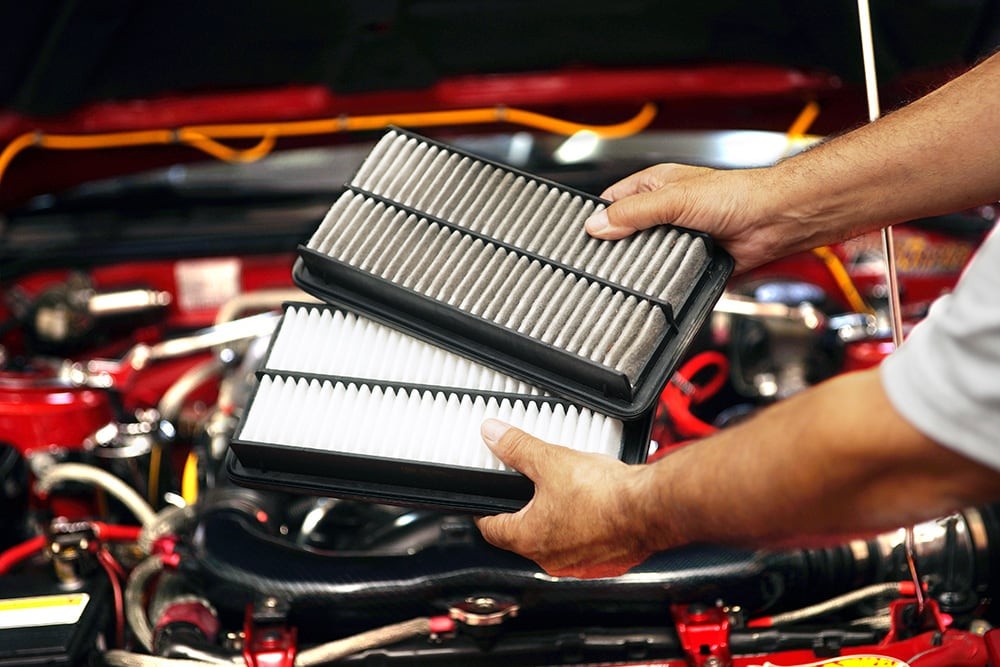Maintaining your Mercedes-Benz means ensuring every component works in harmony. Among these vital parts, the air filter often goes unnoticed, yet it plays a crucial role in both engine performance and cabin air quality. At Mercedes-Benz of Annapolis, we believe in keeping you informed about essential maintenance to prolong your vehicle’s life and enhance your driving experience. Let’s delve into the world of Mercedes-Benz air filters, exploring both the engine air filter and the cabin air filter.
The Importance of Your Mercedes-Benz Engine Air Filter
 Mercedes-Benz engine air filter for optimal vehicle performance. Genuine OEM Mercedes-Benz part.
Mercedes-Benz engine air filter for optimal vehicle performance. Genuine OEM Mercedes-Benz part.
Your Mercedes-Benz engine air filter is the guardian of your engine’s internal combustion system. Its primary function is to prevent harmful contaminants like dust, pollen, dirt, and debris from entering the engine. By trapping these particles, the air filter ensures that only clean air flows into the engine, which is essential for efficient combustion.
Why is clean air so critical? A clean air supply directly translates to optimal engine performance. When the engine receives clean air, it operates smoothly and efficiently, leading to better fuel economy and reduced emissions. Conversely, a clogged air filter restricts airflow, forcing the engine to work harder, which can decrease fuel efficiency and even lead to engine damage over time.
For Mercedes-Benz vehicles, it’s generally recommended to replace the engine air filter every 12,000 to 15,000 miles. However, this interval can vary depending on your driving conditions. If you frequently drive in dusty or polluted environments, more frequent changes might be necessary. Regularly checking your air filter and adhering to the recommended maintenance schedule will ensure your Mercedes-Benz engine breathes clean and performs at its peak.
Cabin Air Filter: Your Breath of Fresh Air Inside Your Mercedes-Benz
While the engine air filter protects the engine, the cabin air filter focuses on the air quality inside your Mercedes-Benz. This filter is responsible for cleaning the air that circulates through your vehicle’s heating, ventilation, and air conditioning (HVAC) system. It works diligently to remove dust, pollen, allergens, and other airborne irritants, ensuring a comfortable and healthy environment for you and your passengers.
Think of your cabin air filter as a shield against outdoor pollutants. It prevents these pollutants from entering your car’s cabin, providing relief, especially for those with allergies or respiratory sensitivities. A clean cabin air filter can significantly improve the air quality inside your vehicle, making every journey more pleasant and healthier.
Mercedes-Benz cabin air filters typically need replacement every 15,000 to 30,000 miles. Similar to engine air filters, driving conditions can influence this interval. If you notice reduced airflow from your vents, unusual odors, or an increase in allergy symptoms while driving, it might be time to replace your cabin air filter.
Schedule Your Air Filter Service at Mercedes-Benz of Annapolis
Maintaining clean air filters is a simple yet crucial aspect of Mercedes-Benz care. Whether it’s the engine air filter ensuring peak performance or the cabin air filter providing a healthy in-cabin environment, regular replacements are essential.
At Mercedes-Benz of Annapolis, our expert service team is ready to assist you with all your air filter needs. Schedule your service appointment today and let us help you keep your Mercedes-Benz running smoothly and your cabin air fresh. We are committed to providing top-quality service and genuine Mercedes-Benz parts to ensure your vehicle always performs at its best.